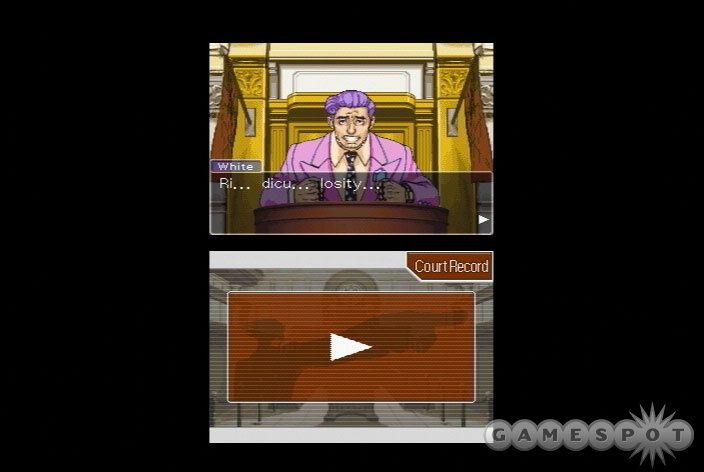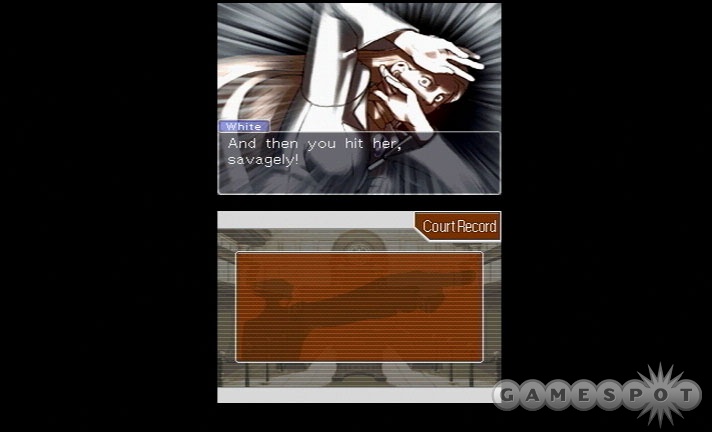Phoenix Wright: Ace Attorney revitalizes both the adventure genre and the Nintendo DS touch-screen functionality by combining an enthralling story with interesting characters, in addition to providing a unique way of interacting with them, case evidence, and the game's scenery. Though the game is heavily text-driven and there's little replayability, it's a bright, rich, and lengthy adventure that could hardly have been improved upon otherwise. If you're interested in a clever, well-presented murder-mystery adventure game, then you'd be hard-pressed to find anything that suits your needs better than Phoenix Wright.

The game has you controlling Phoenix Wright, a lawyer fresh off the bar who is, initially, more than a little nervous. The first case you take on, a murder trial in defense of Phoenix's dopey best friend, Larry Butz, serves as a tutorial in which law firm chief Mia Fey guides you through the ins and outs of courtroom procedure. Each of the game's five cases begins in the same way, as you're treated to a brief cinematic that shows the events of the murder, during which you'll usually get to view the killer. In Phoenix Wright: Ace Attorney, discovering the killer is not the surprise; instead, it's the way in which you bring him or her to justice. The events surrounding the murder always end up leading to the false accusations of innocent witnesses, and as a defense attorney, it's Phoenix's job to get a verdict of "not guilty," despite the lying witnesses, shady prosecutors, and a judge who sometimes forgets the letter of the law.
The majority of the visuals appear on the top screen. Though the game has little in the way of cutscenes, the story is told through a sequence of still shots and through the different exaggerated animations of the characters. There are small details in every given scene that help to give it life, such as moving mouths and other body parts, but for the majority of the game you're working from frame to frame. This is so well presented that you'll hardly notice the gameplay is barely animated. For most of the gameplay, the lower screen is used to forward the text. You can simply tap it at the end of each line to get to the next one. However, during many sequences you must use the touch screen to accomplish something else, whether it's selecting an answer from multiple choices, navigating through a tree of menus, or, most compellingly, pinpointing locations and evidence. The use of the touch screen in this game is perfectly executed, and the only problem with it is that it leaves you wanting to do more.
Each trial begins with witness testimony, and your objective is to find flaws in it, which, since the judge follows a "guilty until proven innocent" mantra, is the only way to get the defendant off the hook. After the witnesses give their testimonies, the cross-examination begins. During the cross-examination, you're free to scroll through witness testimony line by line to better dissect it. There are two ways to reveal problems with testimony. The first is by "pressing" the witness on particular statements. You can do this silently on the touch screen or audibly by shouting "Hold it!" into the DS microphone. Though you can use the microphone in several different ways--and it certainly is satisfying--there's never a requirement to use it.
The second method of procuring information from witnesses is to find a contradiction between testimony and a piece of evidence held in the court record. Throughout the game and trial, you'll acquire different pieces of evidence necessary for winning cases. You'll never need to decide whether something is important or not, because the game will do that automatically. So there's never any chance of you coming to trial unprepared. Within the court record, there's a brief description and a picture of the item. The description almost always clues you in to the facts surrounding the object's importance, whether it reveals a detail about timing, location, or the method in which the object was used. Once you've scrolled to the line in the testimony where the contradiction lies, you can select the evidence proving the contrary, and you can, again, either object silently or vocally into the microphone. To prevent you from objecting to every statement with every piece of evidence, there's a meter that consists of five exclamation points. When you wrongfully object, the judge will penalize you once. Get all five wrong and you lose the case and must start over. Although, admittedly, this is difficult to do if you simply pay attention to the events of the case--and use a little common sense.
The two methods of procuring information will be your primary tools for breaking down the witnesses and getting them to recant their testimonies. Generally, the witnesses will revise their testimonies a few times before you can push them to confession. The judge, although disdainful of many of the activities that go on in the courtroom (particularly when you falsely object), seems to put up with the witnesses' many cover-ups, which might be frustrating if you try to take the law in Phoenix Wright seriously. In fact, you might as well suspend your disbelief about the whole procedure, since, although it feels fairly close to reality, many things go on during the proceedings that would probably horrify actual members of the legal system. Though slightly agitating, it works well within the context of the story, and you'll just feel compelled to work that much harder for the underdog: Phoenix Wright.
The events of the game are not limited to just courtroom drama, as you'll take your investigation to the scenes of crimes, interviewing witnesses on their home turf and interacting with the defendants and police officers down at the precinct. For each trial other than the first one, you'll begin with the news of the murder and the subsequent arrest. Then you'll meet up with the defendant to take on the case, and after that you'll get the opportunity to explore the scene of the crime. This part of the procedure is critical for procuring evidence and for getting testimonies you'll have to uncover in the courtroom. This gives the game a whole Law and Order vibe, as you play the role of both the detective and the lawyer for each case.

At many points during the game, you'll be given the opportunity to choose between multiple options, whether it's to direct a line of questioning a certain way or to reveal new information. Though you'll have a genuine desire to get the correct answer (probably because of the rich reactions of the characters), all choices inevitably lead to the same result. So if you pick "Give up" as opposed to "Press harder," your legal partner will stop you and say "Oh come on, you can't give up now!" This forces you to object anyway. This makes the gameplay really safe, and if you remember that it's almost impossible to lose the game, you might not be compelled to think out the reasoning fully. Instead, you may guess for a heavy portion of the game. What makes the gameplay significant, though, and what will ultimately drive you to want to come up with the correct answer is the way in which the characters interact with one another...and with the pitiful but adorable Phoenix Wright. It's almost impossible not to find him endearing, and the numerous ways in which other people in the courtroom--including the judge, the prosecuting attorney, and even the witnesses--pick on him will have you searching to come up with any way to get him an edge.
The presentation of the game is really quite unique and outstanding. The graphics are simple but work very well to reveal the personality and mood of the characters. Though they're not taken from an existing anime, they're cohesive enough that you would think this entirely probable. Each one is over-the-top, from the naive Phoenix and the severe but gullible judge, to the sexy, evil, and quirky characters you get on the witness stand.
Very much like any evening drama or soap opera, you'll revisit the same characters in multiple trials, and you'll learn more about them and their relationship to Phoenix as the game progresses. You'll get as much information about the characters in their appearances as you do from what they say to you, as everything is revealed in their mannerisms and in their reactions to the events of the case. And although it's almost always clear what Phoenix is thinking, since he generally grimaces about some new piece of evidence or the action of the other attorney, he frequently makes asides that reveal how he really feels about a person or something that's just happened. Of course, the music and sound effects do an excellent job of keeping you clued in to the drama as well. When things get particularly hectic for Phoenix, the music speeds up appropriately. It gets dour when times are tough, and a tuneful reveal plays when something noteworthy is discovered. There's an aspect of the game's atmosphere, most noticeable within the sound effects, that makes Phoenix Wright almost feel like a fighting game. The cross-examination graphic shows the two attorneys going head-to-head, and the sound of unsheathing swords plays during moments of conflict. It's this facet of the presentation that makes the game feel really unique and much more compelling than your average adventure game, and it gives you the incentive to really want to win each case.

Phoenix Wright is a unique game that capitalizes on the DS touch screen and its microphone functionality wonderfully. Depending on your murder-mystery skills, you might find the occasional puzzle too difficult, or you might find the occasional puzzle offers you too much help. But despite being a little linear at times, it's completely satisfying. You'll get a kick out of uncovering clues, revealing different aspects of the characters' personalities, and ultimately solving each case. If Phoenix Wright starts any kind of trend, those fearing the demise of the adventure genre need not worry any longer. Adventure games are back and are hipper than ever. And they have Phoenix Wright: Ace Attorney to thank for it.
